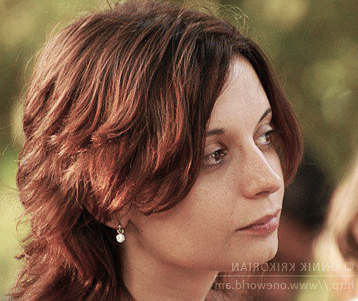
TOWARD A SOCIAL MODEL OF CONFLICT TRANSFORMATION
Marion Kipiani's speech on public hearing
that took place in the village of Tekali with the participation of the dwellers of Akstafa, Baku, Ganja, Gyumri, Ijevan, Marneuli, Noemberyan, Qazakh, Tbilisi,
Yerevan and the frontier villages of Armenia, Azerbaijan and Georgia.
More than 20 years after the break-down of the Soviet Union, the ethno-political and territorial conflicts that emerged in the South Caucasus in the wake of its collapse are still largely unresolved. International and inter-governmental formats of conflict resolution had been instituted since fragile cease-fire agreements were reached in the early 1990s but have not led to stable political agreements.
The need for a social model of conflict transformation in the South Caucasus
More than 20 years after the break-down of the Soviet Union, the ethno-political and territorial conflicts that emerged in the South Caucasus in the wake of its collapse are still largely unresolved. International and inter-governmental formats of conflict resolution had been instituted since fragile cease-fire agreements were reached in the early 1990s but have not led to stable political agreements.

The populations of the countries and non-recognized entities in the South Caucasus are still faced with the undesirable consequences of unresolved conflict, such as lagging democratization; public governance influenced to a large degree by regional and external factors that play on strategic considerations of stability; economic development held back by security concerns, closed borders and embargos; and a large number of displaced persons and refugees who have not yet been properly accommodated, compensated for their losses and/or fully integrated into civil society. Moreover, unharmed physical survival and human security in all its aspects are at serious risk in regions that are still directly affected by the unresolved conflicts, especially along borders, administrative boundary lines, and lines of contact.
Internationally and in academia, there is increasing acknowledgement that sustainable peace must better address these issues of human security. It requires compromises and a willingness to reconcile not only among the political elites of the territories concerned but also among the broader public and among those most affected by conflict. Unfortunately, the past two decades and the attempts at conflict resolution in the South Caucasus region within international and multilateral formats have demonstrated that not only are these concerns not sufficiently addressed, but they are frequently turned into game balls for the achievement or obstruction of strategic political concerns that are perceived to be of a higher order by governments and international actors.
In addition, the secrecy surrounding international negotiation processes, coupled with the lack and distortion of democratization processes in all South Caucasus political entities, allow governing elites to use conflict, its consequences, and strategic stability concerns to harden their grips on domestic power and target dissenting voices as “fifth columnists” of the respective “other side(s)” in the conflict.
In most political entities, and definitely in the three independent countries of the South Caucasus, there is a vibrant civil society concerned with and engaged in peace-building activities that has accumulated a significant depth of expertise and an array of creative concepts to mitigate isolationism and foster reconciliation. However, these actors have often found it hard to gain access to decision-makers within their own governments, not to mention that they are not being allowed a seat at the table in international negotiations.
In addition, civil society actors have to face the reality that their activities in many cases target those groups of engaged (and very often young) people who have already become sensitized to the need for peace-building and reconciliation. Civil society seems to find it difficult to reach out to those groups that are more radicalized and/or with less access to the goods of upward social mobility such as economic prosperity, quality education and health care – thus by definition those population groups most in need of intervention. In many though not all cases these groups overlap with the groups most affected by the consequences of conflicts: IDPs, refugees, and people living in rural and remote areas close to the physical manifestation of conflict divides.
Internationally and in academia, there is increasing acknowledgement that sustainable peace must better address these issues of human security. It requires compromises and a willingness to reconcile not only among the political elites of the territories concerned but also among the broader public and among those most affected by conflict. Unfortunately, the past two decades and the attempts at conflict resolution in the South Caucasus region within international and multilateral formats have demonstrated that not only are these concerns not sufficiently addressed, but they are frequently turned into game balls for the achievement or obstruction of strategic political concerns that are perceived to be of a higher order by governments and international actors.
In addition, the secrecy surrounding international negotiation processes, coupled with the lack and distortion of democratization processes in all South Caucasus political entities, allow governing elites to use conflict, its consequences, and strategic stability concerns to harden their grips on domestic power and target dissenting voices as “fifth columnists” of the respective “other side(s)” in the conflict.
In most political entities, and definitely in the three independent countries of the South Caucasus, there is a vibrant civil society concerned with and engaged in peace-building activities that has accumulated a significant depth of expertise and an array of creative concepts to mitigate isolationism and foster reconciliation. However, these actors have often found it hard to gain access to decision-makers within their own governments, not to mention that they are not being allowed a seat at the table in international negotiations.
In addition, civil society actors have to face the reality that their activities in many cases target those groups of engaged (and very often young) people who have already become sensitized to the need for peace-building and reconciliation. Civil society seems to find it difficult to reach out to those groups that are more radicalized and/or with less access to the goods of upward social mobility such as economic prosperity, quality education and health care – thus by definition those population groups most in need of intervention. In many though not all cases these groups overlap with the groups most affected by the consequences of conflicts: IDPs, refugees, and people living in rural and remote areas close to the physical manifestation of conflict divides.
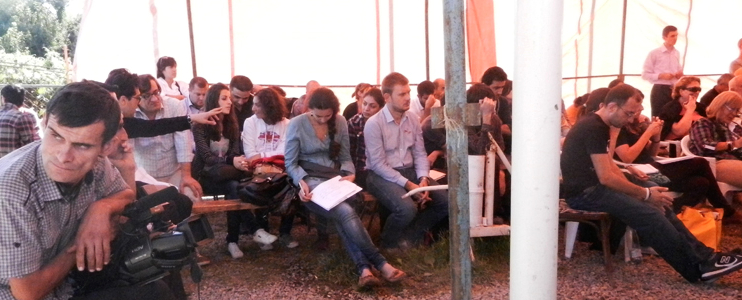
The concept of a social model of conflict transformation
Therefore, we believe it is urgent to develop and strengthen other formats, which are less focused on achieving a political solution to the conflicts but more on transforming the societies of the South Caucasus to promote peaceful, non-violent forms of balancing interests and resolving differences. Such formats should take a more holistic approach, embracing the concept of human security in all its aspects, and thereby highlighting the intrinsically interlinked nature of peace processes, domestic democratization, and the respect and safeguarding of human rights.
We believe that a regular and strategic involvement of civil society and conflict-affected population groups in the conflict transformation processes is at this stage hindered by deformations in public governance as well as in civil society itself. One of the factors holding back sustainable civic involvement consists in the lack of stable platforms that can work out compromise concepts for conflict transformation that are supported by broad intra-societal coalitions. In essence, the sector of “organized” civil society is fragmented along political, ideological and even personal conflicts.
In order to alleviate these shortcomings, we are proposing a process that will lead to what we term a “social model of conflict transformation.” Basically, this model will address questions of the coordination, formalization, and institutionalization of social actors engaged in the conflict transformation process. By tackling these three pillars of civic actions, we expect the model to contribute to an increased legitimacy of civil society as an actor in peace-building: within domestic society, but also toward governmental and international actors.
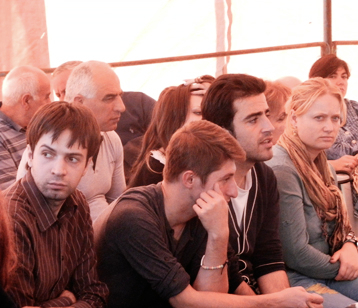
Legitimacy of civil society actions in peace-building
The lack of a democratic environment in the South Caucasus must not serve to cover up the facts that civic activists themselves bears some responsibility for not being perceived within their own societies as legitimate actors in conflict transformation. By definition, civic activism pursues a pluralistic approach to tackling social problems, including those that are root causes and consequences of political conflict. However, civil society has not yet found a sustainable concept of combining this multitude of approaches with a minimum of underlying consensus. This would necessitate civic actors to overcome their own divisions along the lines of urban-rural divides, political sympathies, ideologies, generations, gender etc. Broad legitimacy needs at its base an active linkage of civil society organizations with the population at the grassroots, including and especially with conflict-affected groups such as refugees and IDPs as well as the populations along the lines of cease-fire and contact. Legitimacy also demands a civic sector that strengthens its own capacities in identifying and analyzing problems, as well as proposing models and forms of solution for them.
Coordination and formalization
A stronger civic voice in conflict transformation will require better coordination and more targeted collective action. International and local actors have recognized this, and therefore promote the establishment of civic networks. So far, however, these are either
- initiatives funded by specific projects or programs that largely cease activity once the project/ program that created them has ended; or
- initiatives that are not connected to specific projects and therefore largely lack financial resources, therefore disposing only of a low level of activities and limited visibility within society.
A special role in this context is being played during the past several years by the National Platforms of the EU Eastern Partnership in Armenia, Azerbaijan, and Georgia. These platforms provide non-governmental organizations in different sectors an important networking possibility. At the same time, they suffer from significant weaknesses. With regard to conflict transformation, the most serious of these weaknesses lies in the fact that the European Union does not have a distinctive profile as an actor in conflict resolution, which is largely subsumed in the area of “political dialogue” between the EU and the partner countries. In addition, the platforms so far work mainly on a national level and do not feature any set structures that would allow the regular involvement of the non-recognized entities (Abkhazia, Nagorno-Karabakh, and South Ossetia), which in turn makes regional cooperation more difficult.
We believe civil society collective action needs a broader and more sustainable coordination and formalization, that evolves naturally from the specifics of regional divisions. Any such coalition will need statutes and/or a code of ethics as well as democratic structures (featuring rotational principles for decision-making) in order to be able to work in an inclusive and transparent fashion. Such coalitions would strengthen action based on natural synergies and would contribute to an effective use of resources since they would increase information flows within civil society and in the same measure decrease unhealthy forms of civil society competition.
Institutionalization
Institutionalization of civil society as an actor in conflict transformation will necessitate a certain consolidation of approaches and objectives. At the current stage it appears to be of primary importance to build up legitimacy of civil society action in the eyes of the broader population and those groups that are nominally represented by civil society. In turn, this will require that civic actors follow certain basic principles in their interventions, including:
- effectiveness: To make sure that civic actors address the real needs of their target groups, that they tackle these issues effectively and use means and approaches that have positive consequences or that at the very least “do no harm;”
- transparency: Civic action must be reasonable, comprehensible, and accountable - within organizations/ networks as well as in their external actions. Democratic internal management and decision-making are essential in this regard;
- committed to democratic principles such as non-violence (including in verbal expression and inner structures); pluralism; tolerance; and inclusiveness.
As far as possible, civic actors should strive to build their legitimacy vis-a-vis governments and their institutions particularly at the local level. Such an approach could help civic actors establish themselves as institutions that
- support public institutions with expertise or as “service providers;”
- are important institutions of vertical accountability, linking up the population with the government legislative and executive agencies, especially at the local level;
- competently defend the rights and interests of the population groups they represent and are able to formulate and offer adequate solutions to identified problems.
We acknowledge that such an institutionalization of civic actors in the South Caucasus will be hard to achieve in the short term due to the severe problems of democratization and public governance all entities in the region still encounter. In this context, international actors -- such as international organizations, INGOs, other states’ governments through their regional diplomatic representatives -- are an important anchor of legitimacy for local civic actors. If civic actors are able to work together strategically in highlighting and addressing specific topics, provide adequate expertise, and credibly represent the interests of their target groups, institutionalization of civil society in conflict transformation can to a significant degree be achieved through their collaboration with relevant international actors.
The lack of a democratic environment in the South Caucasus must not serve to cover up the facts that civic activists themselves bears some responsibility for not being perceived within their own societies as legitimate actors in conflict transformation. By definition, civic activism pursues a pluralistic approach to tackling social problems, including those that are root causes and consequences of political conflict. However, civil society has not yet found a sustainable concept of combining this multitude of approaches with a minimum of underlying consensus. This would necessitate civic actors to overcome their own divisions along the lines of urban-rural divides, political sympathies, ideologies, generations, gender etc. Broad legitimacy needs at its base an active linkage of civil society organizations with the population at the grassroots, including and especially with conflict-affected groups such as refugees and IDPs as well as the populations along the lines of cease-fire and contact. Legitimacy also demands a civic sector that strengthens its own capacities in identifying and analyzing problems, as well as proposing models and forms of solution for them.
Coordination and formalization
A stronger civic voice in conflict transformation will require better coordination and more targeted collective action. International and local actors have recognized this, and therefore promote the establishment of civic networks. So far, however, these are either
- initiatives funded by specific projects or programs that largely cease activity once the project/ program that created them has ended; or
- initiatives that are not connected to specific projects and therefore largely lack financial resources, therefore disposing only of a low level of activities and limited visibility within society.
A special role in this context is being played during the past several years by the National Platforms of the EU Eastern Partnership in Armenia, Azerbaijan, and Georgia. These platforms provide non-governmental organizations in different sectors an important networking possibility. At the same time, they suffer from significant weaknesses. With regard to conflict transformation, the most serious of these weaknesses lies in the fact that the European Union does not have a distinctive profile as an actor in conflict resolution, which is largely subsumed in the area of “political dialogue” between the EU and the partner countries. In addition, the platforms so far work mainly on a national level and do not feature any set structures that would allow the regular involvement of the non-recognized entities (Abkhazia, Nagorno-Karabakh, and South Ossetia), which in turn makes regional cooperation more difficult.
We believe civil society collective action needs a broader and more sustainable coordination and formalization, that evolves naturally from the specifics of regional divisions. Any such coalition will need statutes and/or a code of ethics as well as democratic structures (featuring rotational principles for decision-making) in order to be able to work in an inclusive and transparent fashion. Such coalitions would strengthen action based on natural synergies and would contribute to an effective use of resources since they would increase information flows within civil society and in the same measure decrease unhealthy forms of civil society competition.
Institutionalization
Institutionalization of civil society as an actor in conflict transformation will necessitate a certain consolidation of approaches and objectives. At the current stage it appears to be of primary importance to build up legitimacy of civil society action in the eyes of the broader population and those groups that are nominally represented by civil society. In turn, this will require that civic actors follow certain basic principles in their interventions, including:
- effectiveness: To make sure that civic actors address the real needs of their target groups, that they tackle these issues effectively and use means and approaches that have positive consequences or that at the very least “do no harm;”
- transparency: Civic action must be reasonable, comprehensible, and accountable - within organizations/ networks as well as in their external actions. Democratic internal management and decision-making are essential in this regard;
- committed to democratic principles such as non-violence (including in verbal expression and inner structures); pluralism; tolerance; and inclusiveness.
As far as possible, civic actors should strive to build their legitimacy vis-a-vis governments and their institutions particularly at the local level. Such an approach could help civic actors establish themselves as institutions that
- support public institutions with expertise or as “service providers;”
- are important institutions of vertical accountability, linking up the population with the government legislative and executive agencies, especially at the local level;
- competently defend the rights and interests of the population groups they represent and are able to formulate and offer adequate solutions to identified problems.
We acknowledge that such an institutionalization of civic actors in the South Caucasus will be hard to achieve in the short term due to the severe problems of democratization and public governance all entities in the region still encounter. In this context, international actors -- such as international organizations, INGOs, other states’ governments through their regional diplomatic representatives -- are an important anchor of legitimacy for local civic actors. If civic actors are able to work together strategically in highlighting and addressing specific topics, provide adequate expertise, and credibly represent the interests of their target groups, institutionalization of civil society in conflict transformation can to a significant degree be achieved through their collaboration with relevant international actors.
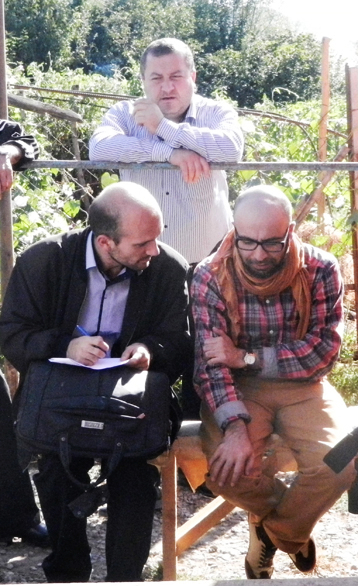
The Tekali process: toward a social model of conflict transformation
The Tekali process started in early 2011 as an irregular series of meetings bringing together civil society activists, political analysts, journalists, artists and public intellectuals from Armenia, Azerbaijan, and Georgia in the village of Tekali. Tekali is located in Georgia’s south-eastern Kvemo Kartli region, which is bordering on Armenia and Azerbaijan and has an ethnically mixed population of mainly ethnic Azerbaijanis with sizable Armenian and Georgian population groups. The rationale for selecting Tekali as a venue for the start of a new socially-led process of peace and confidence building was manifold:
- To provide a space where civic actors from the three countries of the South Caucasus could meet, interact, debate common problems, and try to jointly come up with solutions to some of them. In addition, giving Armenian and Azerbaijani activists the possibility to meet and overcome the mutual isolation of the two societies from each other.
- To remove the process of civil peace building from the countries’ capital cities and give an opportunity to different strands of society (outside organized civil society) to discuss issues of conflict and cooperation. At the same time, to bring to Tekali representatives from communities just across the Armenian and Azerbaijani borders, who live in areas with volatile security, affected by random exchanges of gunfire, explosive remnants of war, and other hazards, thereby being open to the population groups directly affected by conflict.
- To conduct exchanges of opinions in a setting that is an example of peaceful mutual coexistence of different ethnic groups, thus countering the narrative of primordial hatred between national identity groups.
- To promote the approach of local solutions to local problems, that tackles problems of coexistence and communication at the grassroots level and works its way up in a truly bottom-up fashion that takes its justification from addressing local problems of human security.
Meanwhile, the Tekali process has conducted a range of meetings between activists, intellectuals, journalists and other interested stakeholders, taking the format of discussions between representatives of each of the three South Caucasus countries, “open microphone” sessions allowing all participants to voice their ideas, comments, and suggestions, and concluded by a joint lunch or dinner of all participants.
It has created a core group of participants that regularly attend the meetings, while attracting an additional alternating audience of local people, civic activists, and representatives of international organizations, missions, and INGOs. During a visit to Berlin in June 2013, members of the Tekali process were invited by German MP Viola von Cramon to a conference in the Bundestag to introduce the process and its model of conflict transformation. On this occasion, a permanent working group was established to take the Tekali process forward.
In our proposed model, the Tekali process thus has passed through the very initial stages of coordination. As the next steps we therefore propose:
- to push forward formalization of the process by drawing up statutes and an ethics code for the process which will lay down its principles and the foundations of democratic and transparent structures of organization and decision-making;
- to improve communication activities in order to increase visibility of the process, especially among potential participants (grassroots population, local authorities, journalists, local NGOs) from conflict-affected communities along the Armenian-Azerbaijani border; and
- to start building up the capacity of the process and its members to conduct local actions that benefit the grassroots population. The working group members have for this purpose collected suggestions and aim to prepare a specific proposal to establish civic human rights monitoring groups along the Armenian-Azerbaijani-Georgian borders that will identify and report incidents and human rights violations and work together to remedy those violations that have a cross-border element.
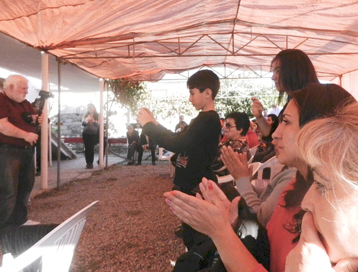
The concept behind FIC is a summation of ideas explored by conflict resolution experts and practitioners in South Caucasus over the past decade. Projects, such as that undertaken by the Caucasus Centre for Peace-Making Initiatives (CCPMI), amongst others, point towards workable models of regional cooperation and provide a ready-made forum for the development of a social model of conflict-resolution in the region. The village of Tekali, Georgia is the geographical centre of South Caucasus and regularly hosts civil society meetings and mediation projects, administered by CCPMI. These meetings and activities gather civic activists and journalists from all three countries of the South Caucasus. It is a sign of the need and demand for such a forum that the number of participants in the Tekali events has been steadily growing since the first meeting, which took place in early 2011.
There has been an on-going debate around questions of institutionalisation. Whilst there is a general agreement that FIC approach should be implicitly regional and include all peoples and territories of South Caucasus, there is less agreement as to what its primary functions should be. One argument is that any proposed Charter and the institutionalisation mechanisms it establishes, should be directed exclusively at conflict-resolution – to foster peace and reconciliation between the peoples of South Caucasus.
Others, however, argue for a wider approach, directed towards promoting regional integration and cooperation. They point to informal commercial cooperation between communities in conflict, such as the Armenian-Azerbaijani wholesale market which sprang up in Sadakhlo, Georgia, and other examples. There is, though, a general agreement that defence and promotion of human rights, the values of democracy and social justice should be at the forefront of the mission of the Charter and its Organisation (regardless of its eventual form and status).
There is very little by way of administrative proposals or considerations of technical dimensions of such an enterprise. Similarly, fundraising and bureaucratic strategies have not yet been explored. There are a number of serious obstacles, and solutions to overcome them need to be developed. At this stage there is a pressing need to coordinate the on-going debate and move it beyond conjecture and towards a practical resolution.
Marion Kipiani
27-09-11
Tekali, Georgia
The hearing passed in framework of Mock Court for Human Rights project by support of National Endowment for Democracy (USA)
There has been an on-going debate around questions of institutionalisation. Whilst there is a general agreement that FIC approach should be implicitly regional and include all peoples and territories of South Caucasus, there is less agreement as to what its primary functions should be. One argument is that any proposed Charter and the institutionalisation mechanisms it establishes, should be directed exclusively at conflict-resolution – to foster peace and reconciliation between the peoples of South Caucasus.
Others, however, argue for a wider approach, directed towards promoting regional integration and cooperation. They point to informal commercial cooperation between communities in conflict, such as the Armenian-Azerbaijani wholesale market which sprang up in Sadakhlo, Georgia, and other examples. There is, though, a general agreement that defence and promotion of human rights, the values of democracy and social justice should be at the forefront of the mission of the Charter and its Organisation (regardless of its eventual form and status).
There is very little by way of administrative proposals or considerations of technical dimensions of such an enterprise. Similarly, fundraising and bureaucratic strategies have not yet been explored. There are a number of serious obstacles, and solutions to overcome them need to be developed. At this stage there is a pressing need to coordinate the on-going debate and move it beyond conjecture and towards a practical resolution.
Marion Kipiani
27-09-11
Tekali, Georgia
The hearing passed in framework of Mock Court for Human Rights project by support of National Endowment for Democracy (USA)
